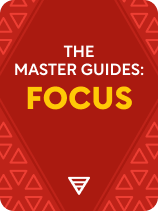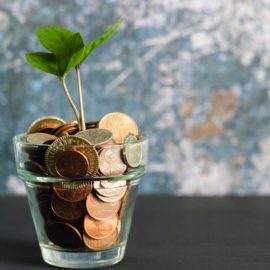

This article is an excerpt from the Shortform book guide to "The Master Guides: Focus" by Shortform. Shortform has the world's best summaries and analyses of books you should be reading.
Like this article? Sign up for a free trial here.
Want to learn how to concentrate better? What do experts recommend when it comes to restoring concentration?
If you find yourself easily distracted and unable to focus, then learning how to concentrate better is essential for achieving your goals, but this can often lead to frustration. Rather than trying to concentrate all the time, experts recommend that you learn ways to refocus yourself to avoid attention fatigue.
Read on to learn how to concentrate better by restoring your focus, according to six expert tips.
How to Concentrate Better
According to productivity experts, even if you eliminate all sources of distraction, it’s still impossible to focus all the time. If you want to learn how to concentrate better, experts recommend that you learn how to refocus your attention, for example, by taking breaks that allow you to recharge in a productive way and quickly refocus. Fatigue is real, so be kind to yourself when your focus wanes and consider using mindfulness practices or rewards to restore yourself.
Remember the Importance of Taking Breaks
Here, we’ll discuss tips on how to concentrate better and the importance of taking breaks to avoid burning out.
Tip #1: Beware of attention fatigue. In his book Focus, psychologist Daniel Goleman explains that attention fatigue occurs when our brains are exposed to a prolonged or demanding task that requires sustained concentration. Once attention fatigue sets in, it becomes more difficult to maintain focus on a task and to process information effectively. Your attention might need restoration if you notice a decrease in your ability to complete tasks effectively and comprehend what you’re learning, an increase in how distractable you are, or an increase in feelings of irritability and impatience.
Tip #2: Practice self-compassion. Psychologist Kelly McGonigal believes that instead of beating ourselves up when we fail to concentrate better or experience decreased focus, we should forgive ourselves. In The Willpower Instinct, she says that encouraging words like “don’t be so hard on yourself” can stop distraction before it starts.
In Procrastination, Jane Burka and Lenora Yuen concur that self-compassion is a powerful tool. If the step toward your goal that you’re focusing on is more challenging than expected and you find yourself becoming distracted, don’t take it as a sign that you’re inadequate. Instead, take a short break. Make Time authors Jake Knapp and John Zeratsky agree that you shouldn’t feel bad about getting stuck, but they encourage you not to give in to distraction. Sometimes it’s better to wait out your mental blocks and keep your mind in the zone.
Tip #3: Refocus by meditating. A time-tested method for learning how to concentrate better while resting is to practice mindfulness meditation. Goleman writes that mindfulness develops the capacity of your selective attention, which helps you monitor your own thoughts and get back on task. McGonigal agrees, saying that even a five-minute daily practice of focusing on your breathing and quieting your mind can increase your impulse control. The goal isn’t to eliminate distracting thoughts; the goal is to keep your thoughts from ruling you. The practice involves the simple act of bringing your wandering thoughts back to focus on your breathing.
And Don’t Forget to Reward Yourself
One of the most difficult parts of learning how to concentrate better is maintaining your efforts over long periods of time. Here are more ways to be consistent by rewarding yourself for your efforts.
Tip #4: Use rewards to train yourself. Burka and Yuen insist on the importance of rewarding yourself when you complete activities you’ve been focused on. They explain that rewards release the chemical dopamine, which increases pleasure. Your brain associates this pleasure with the behavior that created it, strengthening the neural pathways linking your work to good feelings. As a result, your brain will encourage you to return time and again to the activity on which you’ve been trying to focus.
Tip #5: Spend time in nature in order to recharge. One reward that several authors suggest is to take a walk through a place where you’re surrounded by trees. Knapp and Zeratsky say that if you can’t get out into nature, at least make time for a walk in a park or a tree-shaded street. Any exposure to nature at all has been shown to alleviate stress. Goleman adds that immersing yourself in nature, even for a short time, is a powerful and simple way to enter states of restful open awareness.
Tip #6: Relax actively, not passively. To learn how to concentrate better without putting too much pressure on yourself, Goleman recommends getting fully lost in pleasurable activities, as these focus your attention in a relaxed manner and engage all of your senses. Cooking, martial arts, and dancing could be such activities. In Digital Minimalism, Cal Newport argues that demanding activities are more rewarding than passive ones. Dedicating your leisure time to activities such as exercise or creative hobbies energizes you more than idly passing the time. When you learn a new skill or finish a task, it leaves you feeling uniquely proud and accomplished. The more energy you invest in your leisure, the more value you’ll gain.

———End of Preview———
Like what you just read? Read the rest of the world's best book summary and analysis of Shortform's "The Master Guides: Focus" at Shortform.
Here's what you'll find in our full The Master Guides: Focus summary:
- A compilation of the best strategies from experts on improving focus
- How improved focus can improve your career and personal life
- How to create a distraction-free working environment






